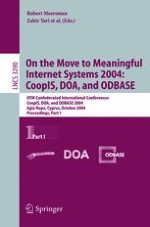2004 | OriginalPaper | Buchkapitel
Integration of Integrity Constraints in Federated Schemata Based on Tight Constraining
verfasst von : Herman Balsters, Engbert O. de Brock
Erschienen in: On the Move to Meaningful Internet Systems 2004: CoopIS, DOA, and ODBASE
Verlag: Springer Berlin Heidelberg
Enthalten in: Professional Book Archive
Aktivieren Sie unsere intelligente Suche, um passende Fachinhalte oder Patente zu finden.
Wählen Sie Textabschnitte aus um mit Künstlicher Intelligenz passenden Patente zu finden. powered by
Markieren Sie Textabschnitte, um KI-gestützt weitere passende Inhalte zu finden. powered by
A database federation provides for tight coupling of a collection of heterogeneous legacy databases into a global integrated system. A large problem regarding information quality in database federations concerns achieving and maintaining consistency of the data on the global level of the federation. Integrity constraints are an essential part of any database schema and are aimed at maintaining data consistency in an arbitrary database state. Data inconsistency problems in database federations resulting from the integration of integrity constraints can basically occur in two situations. The first situation pertains to the integration of existing local integrity constraints occurring within component legacy databases into a single global federated schema, whereas the second situation pertains to the introduction of newly-defined additional integrity constraints on the global level of the federation. These situations gives rise to problems in so-called global and local understandability of updates in database federations. We shall describe a semantic framework for specification of federated database schemas based on the UML/OCL data model; UML/OCL will be shown to provide a high-level, coherent, and precise framework in which to specify and analyze integrity constraints in database federations. This paper will tackle the problem of global and local understandability by introducing a new algorithm describing the integration of integrity constraints occurring in local databases. Our algorithm is based on the principle of tight constraining; i.e., integration of local integrity constraints into a single global federated schema takes place without any loss of constraint information. Our algorithm will improve existing algorithms in three aspects: it offers a considerable reduction in complexity; it applies to a larger category of local integrity constraints; and it will result in a global federated schema with a clear maintenance strategy for update operations.
